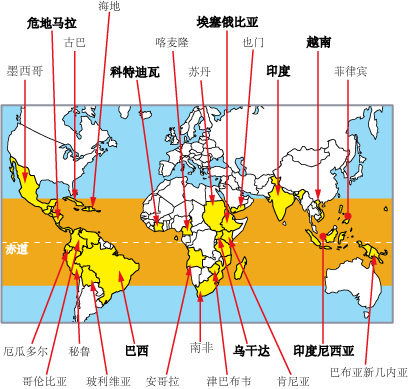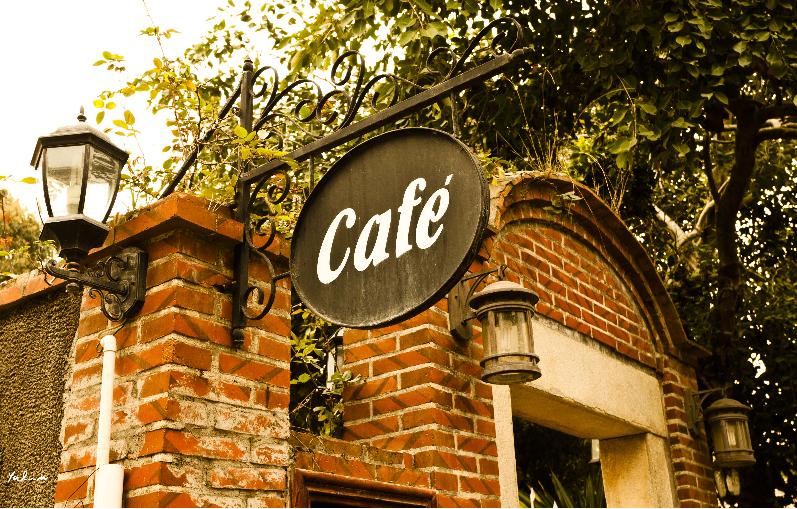Coffee producing area 53 coffee producing areas in the world Costa Rica coffee beans
Costa Rican coffee
Full particles, ideal acidity, unique and strong fragrance
Tarrazu in Costa Rica is one of the major coffee producing areas in the world, with a clear flavor.
Light and pure, pleasant aroma. The volcanic soil of Costa Rica is very fertile and has good drainage. It is Central America.
The first country to grow coffee and bananas for commercial value. Coffee and bananas are the country's main exports
. Coffee was introduced into Costa Rica from Cuba in 1729. Today, its coffee industry is an organization in the world.
One of the most perfect industries, with a yield of 1700 kilograms per hectare. Costa Rica has a population of only 3.5 million.
There are 400 million brown trees, and coffee exports account for 25% of the country's total exports. Costa Rica has also benefited from the
Central American Society for Agricultural Research (Turrialba of the Central American) in Tarasu
Agricultural Research Institute (IAAC for short), which is an important international research center
.
High-quality Costa Rican coffee is called "extra hard beans". This kind of coffee can grow above 1500 meters above sea level.
. Altitude has always been a problem for coffee growers. The higher the altitude, the better the coffee beans, which is not only
Because higher altitude can increase the acidity of coffee beans and thus increase the flavor, but also because of the night at higher altitude.
The late temperature is low, which can make the trees grow slowly, thus making the flavor of the coffee beans more rich. In addition, due to the high altitude
The drop causes sufficient rainfall, which is also very beneficial to the growth of coffee trees. However, although at a higher altitude,
Growing coffee has many advantages, but the additional transportation costs must be taken into account.
Can make the production of coffee unprofitable. The coffee industry in Costa Rica has adopted new technologies to increase efficiency.
This includes the use of "electric eyes" to select beans and identify coffee beans of irregular size.
In Costa Rica, people unload coffee fruits from ox carts
Tarasu, located in the south of the country's capital, San Jos é, is the country's most valued coffee grower.
One of the lands. "Tarasu Latin America" (La Minita Tarrazu) coffee is a local product, but the production quantity
Limited, about 72600 kilograms per year, it is grown on a piece of land called "La Minita"
The land is owned by the last three generations of the McAlpine family in England. In fact, this piece of soil
The land can produce more than 450 tons of coffee every year. But Tarasu Latin American coffee is grown without artificial fertilizers or
Insecticide, whose harvest and selection are all done by hand, in order to avoid air spray selection.
Damage to coffee beans to some extent.
Other coffee worth mentioning are Juan Venus (Juan Vinas,PR) and Tulnon (H.Tournon)
), Windmill,SHB, Monte bello and Ssnta
Rosa). Fine coffee is generally grown in Geredia and the central canyon. Another kind of eye-catching
The coffee is Sarchi Coffee (Saatchi represents the five towns of Costa Rica's "Coffee Road"
It grows on the slopes of the Poas Volcano volcano, 53 kilometers from San Jose.
Saatchi, founded in 1949, has a land area of 30770 hectares and grows sugar cane and coffee. This area is also
Famous for its handicrafts, it attracts tourists from all over the world.
The country's coffee industry was originally owned by the Costa Rican coffee industry company Instituto del Caf é de
Costa Rica, or ICAFE), is now under the control of the official Coffee Committee (Oficina del Caf é).
) take over. In the exported coffee, those products that are considered to be of unqualified quality are colored with blue vegetable dyes.
And then back to domestic sales. Coffee consumed in China (dyed blue or undyed) accounts for about the total output.
With 10% of the volume, local per capita coffee consumption is twice that of Italy or the United States.

Important Notice :
前街咖啡 FrontStreet Coffee has moved to new addredd:
FrontStreet Coffee Address: 315,Donghua East Road,GuangZhou
Tel:020 38364473
- Prev

Introduction of 53 Coffee producing areas in the World
1. Costa Rica Costa Rica 2. Cuba Cuba 3. Dominican Republic Dominican Republic 4. Ei Salvador El Salvador 5. Guadeloupe Guadeloupe 6. Guatemala Guatemala 7. Haiti Haiti 8. Honduras Honduras 9. Jamaica Jamaica 10. Martinique Martinique 11. Mexico Mosi
- Next

What do you need to run a coffee shop? how to choose a coffee shop? how can I open a coffee shop?
How to choose the location of the cafe: we usually think that a place with a large flow of people is good, but this is not the case! A large flow of people is not necessarily your guests, coffee is not a necessity in China, what these people need more is food! And the rent in places with a large flow of people is often very expensive. Cafe site selection can directly give up the busy front-line facade with a large flow of people, and go directly to the second.
Related
- What documents do you need to go through to open a coffee shop? coffee shop coffee shop certificate processing process
- How to purchase Coffee beans in small Cafe how to choose a suitable supplier for domestic Coffee supply Company
- How to drink Starbucks Fragrance White Coffee? how to make Australian White Coffee? what Italian coffee beans are recommended?
- The Story of Flora Coffee: the name of Flora Coffee Bean and the implication of the Flowers on Florna Coffee
- How much does a cup of coffee cost? How much is the profit of a cup of coffee? What is the profit of the coffee shop in a year?
- Yunnan small Coffee, known as "fragrant Coffee", introduces the characteristics of Alpine Arabica Coffee producing areas in Yunnan, China
- 2023 latest Starbucks full menu price list how much is a cup of Starbucks coffee what is better to drink the most popular hot and cold drinks recommended
- Starbucks different kinds of Coffee Price list Starbucks menu 2023 Top Ten Best drinks in Starbucks
- Starbucks Spring praise Comprehensive matching Coffee Bean theme Story Packaging implication and taste description
- The cost of a cup of coffee latte American coffee cost price and selling price

